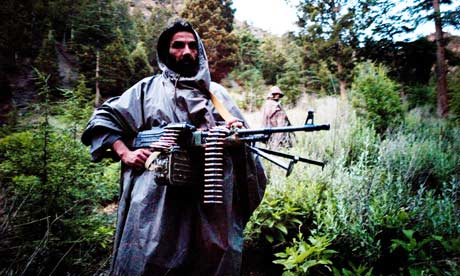
-
Thursday 2 June 2011 21.00 BST
- Article history

The house is at the top of a narrow, steep, dirt road in one of Kabul's dusty suburbs, a neighbourhood with few police and fewer international soldiers. It is home to Mohammed Qalamuddin, the former head of the Taliban's infamous religious police.
Captured in 2003, two years after the extremists' regime collapsed, and freed in 2005, the 60-year-old cleric has since been rehabilitated. Appointed to the High Peace Council, a 70-member body created last year to oversee the process of "reconciliation" with the insurgents in Afghanistan, Qalamuddin recently met General David Petraeus, the overall commander of Nato forces in Afghanistan, to discuss the treatment of Taliban prisoners in US-run jails.
For more than a decade Qalamuddin, who personally issued an edict banning make-up and high heels in the Afghan capital and whose men routinely beat women who broke the Taliban's strict laws on dress in the 1990s, has been among about 140 former Taliban and al-Qaida figures under United Nations sanctions preventing them travelling or holding bank accounts. Now he is on a list of 18 candidates submitted to the UN last month whom the Afghan government want to be freed from the sanctions.
"I have a right to live like other people," Qalamuddin said in an interview. "This has become painful to me."
The British and US governments will back the move to "delist" the 18 at a key meeting of the UN sanctions committee in two weeks. Over coming months, sanctions on scores more figures who played prominent roles in the former regime could be lifted.
Britain and the US believe the move will send a public message to active insurgents that, if conditions are met, their reintegration into normal Afghan life is possible.
Though Russia is thought likely to try to block the attempt to lift the sanctions at the coming meeting, intensive diplomatic lobbying is underway in New York. For Qalamuddin's journey from outlaw to interlocutor is one which American and British officials hope many others will make – particularly senior leaders of the insurgency.
For more than two years there have been reports of talks between protagonists in the 10-year-old conflict in Afghanistan. Last month the first direct meetings between US officials and the Taliban were reported. Officials in Kabul confirmed that a man thought to be the personal secretary of Mullah Mohammed Omar, the Taliban's supreme leader, has taken part in three rounds of contacts in Qatar, Germany and again in Qatar.
A US official refused to confirm the talks. "To get meetings you make a commitment not to talk about them [particularly] when you are in a delicate situation and you are trying to find out if there is room for manoeuvre for you or for them," he said. "There are several layers of conversations going on."
Afghan officials have told the Guardian about further contacts in recent weeks. A representative of the senior Taliban leadership has repeatedly visited Kabul to speak to senior figures within the Afghan government, officials said. They described the contacts as "systematic", saying they went well beyond previous exchanges and involved "proposals and counter proposals."
The officials also said there have been "very recent" contacts with representatives of the Haqqani network, seen by some analysts as the most intractable of the insurgent groups and the one closest to the Pakistani intelligence services. Named after its leader, the ageing cleric and warlord Jalaluddin Haqqani, the network has been responsible for several spectacular bombings and years of violence in the east of Afghanistan. The officials said that tribal dynamics provided openings for discussions with elements of the network, which is based in Pakistan and is believed to be close to Pakistani security services.
The Afghan government is keen to boost confidence in the so-called peace process.
"Peace is a process not a deal. Overall I think we can be cautiously optimistic," Massoum Stanekzai, Afghan minister for reconciliation, said.
However, many are less confident in any real progress. Previous meetings in Saudi Arabia, the Maldives and elsewhere have produced few concrete results. With the military situation in Afghanistan showing no immediate breakthrough despite the commitment of tens of thousands of additional troops and vast expenditure, there is an incentive for western politicians facing unhappy domestic opinion and tight budgets to claim progress towards a peaceful settlement in Afghanistan.
President Barack Obama is expected to announce the withdrawal of some US troops next month. American military costs in Afghanistan will reach an estimated $112bn (£68.4bn) this year and political opposition in the US is growing. The prime minister, David Cameron, has already announced he wants to bring home 450 British troops this summer. Nearly 9,000 will remain.
Coming deadlines include a major conference at the end of this year, the American presidential elections of 2012 and 2014 when all international combat troops are due to leave Afghanistan to allow a full "transition" of security operations to local forces.
"We're running the risk of constructing, or buying into, a narrative of peace deals and negotiations which does not match the reality. This is what worries many Afghans," said Martine van Bijlert, co-director of the Afghanistan Analysts Network.
Much also depends on the regional situation. Diplomats and officials in Kabul say pressure from Pakistan on the senior leadership based there is "essential."
Then there is the question of Taliban links with al-Qaida. Repudiating Osama bin Laden's terrorist group was dropped as a precondition for talks by the Americans in February.
Abdul Hakeem Mujahed, a former Taliban ambassador to the United Nations who is known as a moderate in the movement, said that the death of the al-Qaida leader changed nothing.
"Bin Laden's agenda was international. The Taliban's is national. The presence of foreign troops means a common enemy so they are helping each other. But if the troops were not there, they wouldn't," Mujahed said.
Those in Afghanistan who fear the return of a deeply conservative regime, one which has a history of ethnic and sectarian violence, will also have to be reassured for the reconciliation process to progress.
"If there is cooperation, sympathy, genuine will and clear policies, then a deal can be achieved," said Mujahed, the former Taliban and peace council member. "If the world community just wants to leave the battle to local security forces and reduce its own expenditure then I am pessimistic."
Even the more optimistic diplomats in Kabul do not see any "grand deal" as likely in the foreseeable future.
Opponents of negotiations say the west has invested too much to make too many concessions.
"We cannot have the Taliban emirates again," Hanif Atmar, a former minister of interior, said.
"Too many hundreds of young British soldiers have died. For what? To bring the Taliban back? That is not the promise that western leaders made to us or their own voters."
Qalamuddin, the former head of the religious police, said however the Taliban had "changed".
"It would not be like before," he told the Guardian indicating the television, which he banned in 1998, in the corner of his own living room.
The US official said the eventual outcome of any talks was not obvious. "It's three dimensional chess and whether it is going to get anywhere is not clear," he said. "But it is clear we have to try."
No comments:
Post a Comment